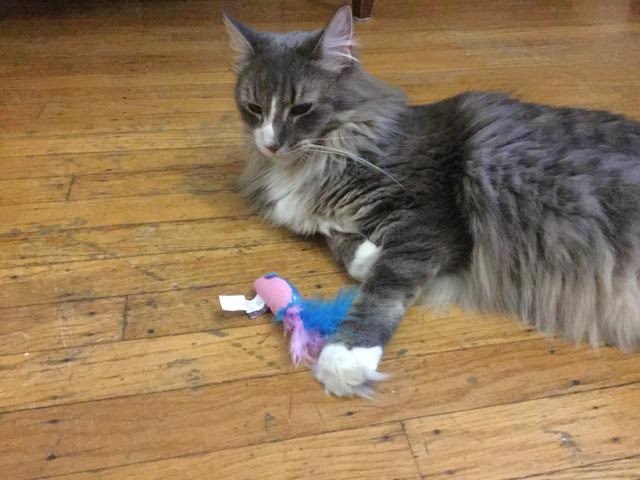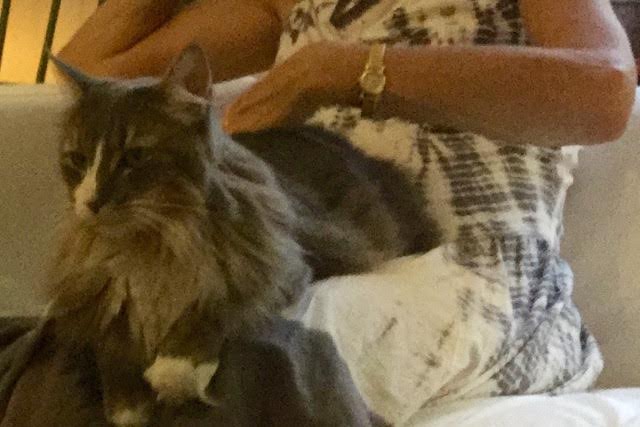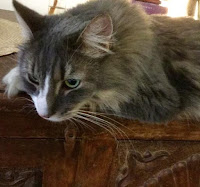29 Apr Ruined Couches – Indiscriminate Urination
Com Com’s Story ….
Ruined Couches; Litter Box Issues
“I don’t want to part with Com Com,” said Nancy, “but we can’t go on like this.” Com Com slithered his long, handsome body into the living room as Nancy spoke.
Nancy had adopted Com Com from a woman who was about to send him to a shelter. He had been declawed at four months, and when he was unable to coexist with her two new cats and dog, he went to live with a friend who returned him when he started to avoid the litter box. That was two years ago when he moved in with Nancy.
He was now five, and Nancy had already replaced her couches a few times. His “incidents” were not limited to the couches and usually occurred during the night. Com Com didn’t sleep with Nancy as she was a restless sleeper so he had the rest of the apartment to cozily spend the night.
I explained to Nancy that Com Com’s litter box issues were triggered by post traumatic stress disorder (PTSD). He was traumatized by the loss of his original home, his tolerance of stress was overstretched and the removal of his claws made him emotionally more vulnerable. Com Com’s incidents of indiscriminate urination and defecation were symptomatic of his angst. His bladder and rectum were his stress targets. When he relived the “old” occurrences, he had an anxiety attack and avoided the litter box to communicate his discomfort.
As I spoke, Com Com climbed on to Nancy’s lap and stretched out as the mp4 of relaxation music played in the background. “ So what can I do to make him feel better and dispense with these symptoms?” said Nancy.
These are some of the major recommendations I offered to relieve Com Com’s PTSD:
- Continue to play Com Com’s music which will remind him of his session and reinforce his relaxation and self-confidence.
- As most of his incidents occur during the night, sequester him in the bathroom with his litter box and creature comforts. Do this in a fun, seductive way. He may prefer his box in the bathtub, and put a few wee wee pads on the floor as most of his incidents were on a soft surface — which reminded him of the comfort-contact he had with his mother.
- Make an appointment with the vet to rule out any medical problems such as irritable bowel syndrome which can also trigger bladder discomfort. A diet change may be recommended.
- Increase his confidence with your acknowledgments of him: “ Com Com, you’re so mellow, so courageous, so handsome and relaxed.” Whatever makes you feel good will work for him. He’s so sensitive to your voice and body language. Accentuate the positive.
As I said my Good Byes I sprinkled some more catnip on one of Com Com’s toys and asked Nancy to follow up with a progress report.
Nine days later Nancy emailed me:
I want to thank you for guiding me to understand Com Com’s character. He is such a sensitive, intelligent cat. I’ve become more sensitive to his needs. Since you were here he has consistently used his litter box, which is now in the bathtub. He only had to be sequestered for a couple of nights. I leave him food in his bowl before I go to work. He eats some of it but waits for me to return from work before he eats the rest. As he eats, he looks at me and wants me to stroke him. If I move away, he stops eating. I now realize that as long as we appreciate Com Com and are sensitive to his needs, he will feel better, slowly recover from his PTSD and won’t have the need to display such un-catlike behavior.
I messaged Nancy that I was so very happy that Com Com was happy, and wished him continued recovery.
……..






